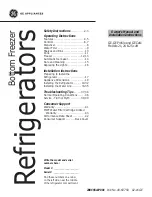
Unit Description
22
System Operation
Several operating characteristics of the unit are:
•
All zones can cool at the same time.
•
All zones can heat at the same time.
•
Any zone can cool while any other zone heats.
•
When the host zone is in defrost, it may delay
cool or heat in the other zone(s).
•
When a zone is in null, the blowers may run
but the zone does not cool or heat.
•
When a zone is in heat while another zone is
in cool, the evaporator in the zone that is in
heat acts as the condenser.
•
The condenser inlet solenoid and the suction
line solenoids are normally open solenoid
valves that close when energized.
•
The liquid line solenoids, the hot gas
solenoids, the receiver tank pressure solenoid
and the purge valve are normally closed
solenoid valves that open when energized.
•
The flow of refrigerant through the system is
controlled by the solenoid valves and the
check valves.
•
If the condenser inlet solenoid is energized
(closed) because a zone is in heat or defrost,
and if the discharge pressure exceeds 400 psi
(2758 kPa), the condenser inlet solenoid is
de-energized until the discharge pressure
drops below 250 psi (1724 kPa).
•
The receiver tank pressure solenoid and the
purge valve are energized (open) when any
zone is in heat or defrost. If the discharge
pressure exceeds 300 psi (2068 kPa), the
receiver tank pressure solenoid and the purge
valve are de-energized until the discharge
pressure drops below 225 psi (1551 kPa).
•
During engine operation when all zones are in
cool, the microprocessor will shift the engine
to low speed if the discharge pressure exceeds
425 psi (2930 kPa). High speed is enabled, if
required, when the discharge pressure drops
below 375 psi (2586 kPa).
•
During engine operation when all zones are in
heat, the microprocessor will shift the engine
to low speed if the discharge pressure exceeds
375 psi (2586 kPa). High speed is enabled, if
required, when the discharge pressure drops
below 300 psi (2068 kPa).
Summary of Contents for 002008
Page 4: ...4 ...
Page 30: ...Unit Description 30 Figure 9 Front View AJA920 ...
Page 31: ...Unit Description 31 1 Access Panels 2 Defrost Damper Figure 10 Back View 1 2 ARA104 ...
Page 114: ...Mechanical Diagnosis 114 ...
Page 116: ...Electric Standby Diagnosis 116 ...
Page 120: ...Remote Evaporator Specifications 120 ...
Page 122: ...Remote Evaporator Maintenance Inspection Schedule 122 ...
Page 128: ...Remote Evaporator Electrical Maintenance 128 ...
Page 132: ...Remote Evaporator Refrigeration Service Operations 132 ...
Page 134: ...Remote Evaporator Structural Maintenance 134 ...
Page 136: ...Remote Evaporator System Diagnosis 136 ...
Page 140: ...Index 140 ...
Page 142: ......
Page 143: ...143 Model 30 Schematic Diagram Page 1 of 2 ...
Page 144: ...144 Model 30 Schematic Diagram Page 2 of 2 ...
Page 145: ...145 Model 30 Wiring Diagram Page 1 of 4 ...
Page 146: ...146 Model 30 Wiring Diagram Page 2 of 4 ...
Page 147: ...147 Model 30 Wiring Diagram Page 3 of 4 ...
Page 148: ...148 Model 30 Wiring Diagram Page 4 of 4 ...
Page 149: ...149 Model 50 Schematic Diagram Page 1 of 2 ...
Page 150: ...150 Model 50 Schematic Diagram Page 2 of 2 ...
Page 151: ...151 Model 50 Wiring Diagram Page 1 of 5 ...
Page 152: ...152 Model 50 Wiring Diagram Page 2 of 5 ...
Page 153: ...153 Model 50 Wiring Diagram Page 3 of 5 ...
















































